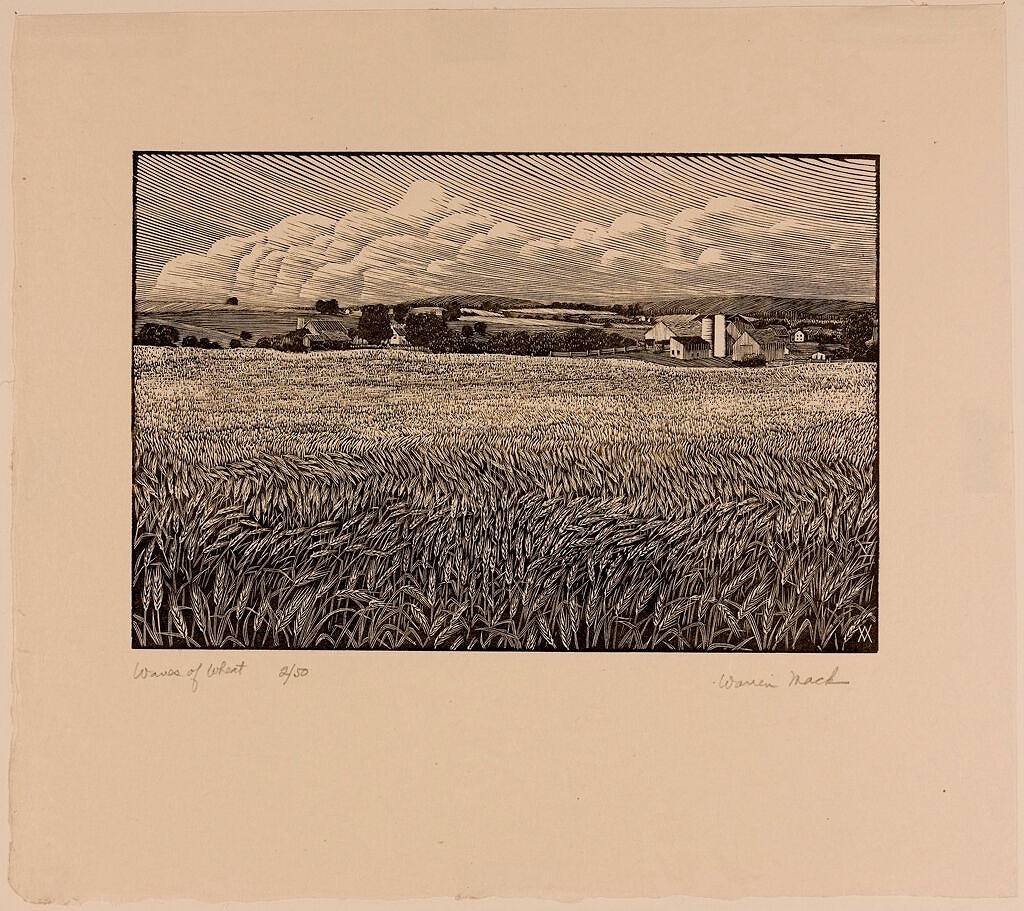Evan&Sara

Warren Mack: Waves of Wheat (20th century)
"It should be no wonder."
According to a history written by their daughter Ada, my 2X great-grandfather Evan Arthur Wallace, born in Marysville, Iowa, in February 1847, married my 2X great-grandmother, Sara Adeline Jackson, born in March 1851, on August 16, 1868, at Lovilia, Iowa. They moved onto a farm situated between Lovilia and Albia, Iowa, where they brought three sons into the world: Theodore Penn (1869), my great-grandfather Nathaniel Parker (1871), and William Elmer (1874). When Elmer was three weeks old, they left Iowa with all their belongings that they could carry in a buckboard and set out for Fort Dodge, Iowa, intent upon joining an emigrant train bound for Salt Lake City. They expected to buy a covered wagon, supplies, and tools, then travel overland to Dayton, Washington. Reports of "Indian trouble" along the route convinced them to take an overland stage instead. "There were no roads, just wagon tracks, and driver knowledge. Women and children rode inside the stage while men rode on top with rifles at the ready." They were frightened by Indians twice, and at The Great Oregon Divide, women and children left the stage to walk rather than ride over that narrow passage.
The stage took them to Walla Walla. They were the first in my immediate family to arrive here. They gravitated to Weston, Oregon, just over the border and on the fringe of the valley, where Sara's sister Maryanne had already settled with her husband, Charlie Royse. They lived in Weston, where Evan worked as a farm hand for a Mr. Huston near Athena, until 1885. The boys slept in a tent beside a small cabin. In the summer of 1875, Theodore, aged 6, and Elmer, aged 1, died of diphtheria, a common child killer then. In 1886, the family left this valley to take up residence on a donation land claim of 80 acres on Hail Ridge, twenty-five miles west of Heppner, Oregon. This claim also included 80 acres of timberland, where he cut the timber for a cabin, hauling it to Heppner to be milled into lumber. Evan built a 30' X 18' cabin and dug a well that never produced enough water for the livestock.
Evan&Sara had six children still living when they moved onto Hail Ridge. They would add two more while there. Twice daily, fifteen-year-old Nat would drive the livestock down into what was called Sweet Milk Canyon for water. Elsworth (Elza) Van Schoiack owned the ranch along that canyon. His daughter Clara would become Nat's wife and my first great-grandmother. I've long romanticized their connection, though I don't know the story other than that they lived in relatively close proximity and ended up marrying. In 1893, the family moved closer to town, to Rock Creek, where Evan built another home, where they lived for three years. By then, Nat and Clara were married and living nearby, where he raised sheep. Evan worked for Nat for a time during this period. He later started a drayage business, hauling freight between Condon and Arlington, starting about 1902. He and Sara moved into Condon then, and he built another house where they lived until they died. He died in 1913 of bladder cancer. She died in 1927. She would have Parkinson's Disease in her later years, an affliction her grandaughter, Nat and Clara's oldest, Myrtle (born 1894 in Rock Creek), would also contract, as would my mother, Sara's great-grandaughter Bonnie Wallace.
By all accounts, Evan&Sara created a lively and close-knit family. Their daughters were close through their adult lives. My mother's family always seemed to be everywhere. She grew up in Condon, where I would later be born, a town small enough that everyone knew everyone else's business, especially if you were related. It seemed that she was related to half that town. Sara maintained a "keen interest in governmental affairs" and was said to have been "quite a politician." She voted as a Democrat until Al Smith ran. Evan remained a strong Democrat. Of course, the history insists that they were clean-living and sober people, even joining the Reorganized Church of Jesus Christ of Latter-Day Saints in their later lives. Still, The Muse found a report from a 1911 Portland newspaper about a man charged with reckless driving on a downtown Portland street, driving an automobile in reverse, colliding with a milk wagon, and totaling the car. The driver, identified as one Evan Wallace, insisted that he hadn't been driving fast enough to do anything but topple someone over had he hit them. The article reported that he had been drinking.
A photo (secure in the landlocked steamer trunks in my sister's basement) of Sara taken in her last years is the absolute spitting image of my mother in her later years. It is shocking to see a photograph of her doppelganger, dated before my mother was born. Sara planted rhubarb near the backdoor of her Hail Ridge cabin. I visited that place years ago and found the rhubarb still there, remarkable given the harsh climate of that basalt-cap country. They were dryland wheat farmers on land barely capable of growing wheat. They raised sheep and cattle, too, and managed to thrive. I remain enormously proud of these two who left what must have been a safe and secure Iowa for a late arrival in Oregon. The Edens at the end of their Oregon Trail had already been settled by the time they arrived in 1874. They thrived, anyway. It should be no wonder. They had the long Wallace history and the tough Parker and Jackson heritage behind them.
©2024 by David A. Schmaltz - all rights reserved


